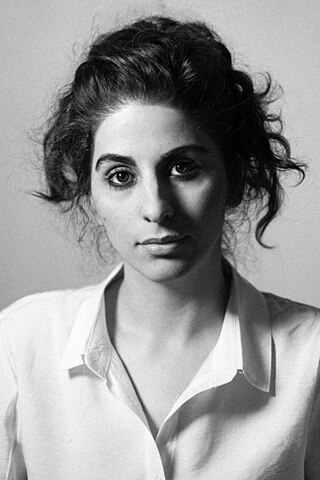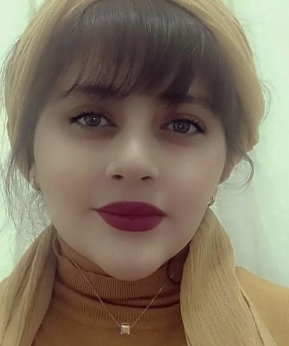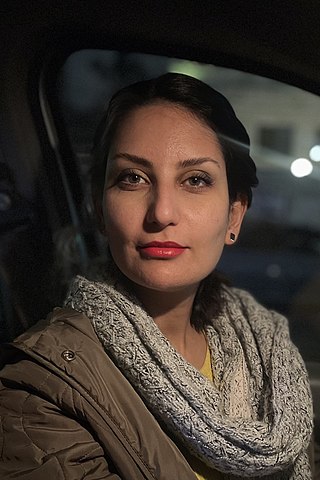
Evin Prison is a prison located in the Evin neighborhood of Tehran, Iran. The prison has been the primary site for the housing of Iran's political prisoners since 1972, before and after the Iranian Revolution, in a purpose-built wing nicknamed "Evin University" due to the number of students and intellectuals housed there. Evin Prison has been accused of committing "serious human rights abuses" against its political dissidents and critics of the government.

Faezeh Hashemi Bahramani, better known as Faezeh Hashemi Rafsanjani is an Iranian women's rights activist, politician and former journalist who served as a member of Iranian parliament from 1996 to 2000. She is also president of Executives of Construction Party women's league and the former editor-in-chief of Zan newspaper.

Maryam Rajavi is an Iranian dissident politician and the leader of the People's Mujahedin of Iran (MEK), an organization advocating the overthrow of the Iranian government, and president-elect of its National Council of Resistance of Iran (NCRI). She is married to Massoud Rajavi, who is the co-leader of MEK.

The state of human rights in the Islamic Republic of Iran has been regarded as very poor. The United Nations General Assembly and the Human Rights Commission have condemned prior and ongoing abuses in Iran in published critiques and several resolutions. The government is criticized both for restrictions and punishments that follow the Islamic Republic's constitution and law, and for "extrajudicial" actions by state actors, such as the torture, rape, and killing of political prisoners, and the beatings and killings of dissidents and other civilians. Capital punishment in Iran remains a matter of international concern.
During the late 20th and early 21st centuries in Iran, women's rights have been severely restricted, compared with those in most developed nations. The World Economic Forum's 2017 Global Gender Gap Report ranked Iran 140, out of 144 countries, for gender parity. In 2017, in Iran, females comprised just 19% of the paid workforce, with seven percent growth since 1990. In 2017, the Georgetown Institute for Women, Peace and Security (WPS) Index ranked Iran in the bottom tercile of 153 countries. Compared to other South Asian regions, women in Iran have a better access to financial accounts, education, and cellphones. Iran was ranked 116, out of the 153 countries, in terms of legal discrimination against women.

Majid Tavakoli is an Iranian student leader, human rights activist and political prisoner. He used to be a member of the Islamic Students' Association at Tehran's Amirkabir University of Technology, where he studied shipbuilding. He was arrested at least three times by the Iranian Ministry of Intelligence, during the student protests over the disputed Presidential Election of 2009. In response to allegations that he cross-dressed as a disguise to avoid arrest, a campaign protesting his imprisonment featured men posting photos of themselves wearing hijab.

Narges Mohammadi is an Iranian human rights activist and Nobel laureate. She is the vice president of the Defenders of Human Rights Center (DHRC), headed by her fellow Nobel Peace Prize laureate, Shirin Ebadi. Mohammadi has been a vocal proponent of mass feminist civil disobedience against the hijab in Iran and a vocal critic of the hijab and chastity program of 2023. In May 2016, she was sentenced in Tehran to 16 years' imprisonment for establishing and running "a human rights movement that campaigns for the abolition of the death penalty." She was released in 2020 but sent back to prison in 2021, where she has since given reports of the abuse and solitary confinement of detained women.
On July 26, 2010, seventeen prisoners from Ward 350 of Evin prison, Iran, executed a 16-day hunger strike to protest solitary confinement, as well as the poor living conditions within the prison. This included the lack of necessary medical treatment, arbitrary detention, denial of access to legal counsel, suspension of visitation privileges and abuse from prison guards. Subsequent to the hunger strike, authorities placed the seventeen prisoners in solitary confinement in Ward 240, while also prohibiting them from making phone calls, visiting their families, or contacting their lawyers. Overall, the action did not achieve its objectives of improving conditions within the prison or gaining access to legal counsel. However, one of the prisoners on strike, Babak Bordbar, was released for unknown reasons on August 10.

Atena Daemi Khoshknudhani is an Iranian civil rights activist, children's rights activist, human rights activist and political prisoner in Iran. Daemi was last arrested in November 2016 and sentenced seven years prison sentence. Peaceful activities for which she was charged include distributing anti-death penalty leaflets and making posts on Facebook and Twitter criticising Iran's execution record. Later, Daemi and her sisters were arrested and sentenced on charges of having "insulted officers on duty". Subsequent appeals have overturned that conviction and reduced Daemi's original sentence.
The Girls of Enghelab protests are protests against the compulsory hijab in Iran, part of the wider Iranian Democracy Movement. The protests were inspired by Vida Movahed, an Iranian woman known as the Girl of Enghelab Street, who stood in the crowd on a utility box on Enghelab Street in Tehran on 27 December 2017 during the 2017–2018 Iranian protests who tied a white headscarf, to a stick, and waved it to the crowd as a flag. She was arrested on that day and was released temporary on bail a month later, on 28 January 2018. Some people interpreted Movahed's action as being based on Masih Alinejad's call for White Wednesdays, a protest movement that the presenter at VOA Persian Television started in early 2017. Other women later re-enacted her protest and posted photos of their actions on social media. These women are described as the "Girls of Enghelab Street" and the "Girls of Revolution Street" in English sources. Some of the protesters however claim that they were not following Masih Alinejad's call. The protests intensified in 2022 due to the death of Mahsa Amini.
Golrokh Ebrahimi Iraee or Golrokh Iraee is an Iranian writer, accountant, political prisoner and a human rights defender who advocates against the practice of stoning in Iran. As a religious prisoner of conscience she was represented by Vice Chair of the USCIRF Gayle Manchin.
Raheleh Rahemipour is a human rights activist from Tehran, Iran. She is best known for her campaigns to search for her forcibly disappeared family members, and for her peaceful activism for other victims of summary execution and enforced disappearance.
Yasaman Aryani is an Iranian political prisoner. She appeared without a head scarf, and talked about it on social media.
Saba Kord Afshari is an Iranian political prisoner. She appeared without a head scarf in public, in defiance of Iran’s compulsory hijab laws, and posted a video about it on social media.
Shaparak Shajarizadeh is an Iranian women's rights activist and a former political prisoner. She is also a member of women's committee of Iran Transition Council. Shajarizadeh is well known for her efforts in empowering Women's rights in Iran and activism against Iran's contemporary compulsory hijab law. She possess anti-headscarf sentiments and also pioneered online campaigns such as "Girls of Revolution Street" and "White Wednesdays" as a part of the protests against compulsory hijab in an effort to encourage both men and women in Iran to post images in the social media platforms of themselves without wearing headscarves. She was arrested and imprisoned twice for defying Iran's laws about compulsory hijab laws.

Sepideh Rashnu is an Iranian writer, who is imprisoned for protesting against state-imposed hijab rules. In July 2022, she had an altercation on a public bus with another woman over the hijab rules, and the video went viral on social media.

On 16 September 2022, 22-year-old Iranian woman Mahsa Amini, also known as Jina Amini, died in a hospital in Tehran, Iran, under suspicious circumstances. The Guidance Patrol, the religious morality police of Iran's government, arrested Amini for allegedly not wearing the hijab in accordance with government standards. The Law Enforcement Command of the Islamic Republic of Iran stated that she had a heart attack at a police station, collapsed, and fell into a coma before being transferred to a hospital. However, eyewitnesses, including women who were detained with Amini, reported that she was severely beaten and that she died as a result of police brutality, which was denied by the Iranian authorities. The assertions of police brutality, in addition to leaked medical scans, led some observers to believe Amini had a cerebral hemorrhage or stroke due to head injuries received after her arrest.

Deaths during the Mahsa Amini protests refer to those people who were killed due to Iran's nationwide protests of 2022, triggered by the death of 22-year-old Kurdish Iranian Jina Mahsa Amini on September 16, 2022, in a Tehran hospital under suspicious circumstances.
Nazila Maroufian is an Iranian civil activist, political prisoner and journalist who works for the news media Roydad 24.

Donya Rad is an Iranian social media activist and script supervisor who was arrested by the Islamic Revolutionary Guard Corps during the Mahsa Amini protests.










